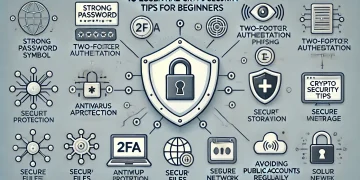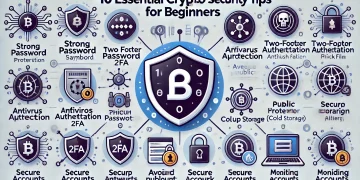Cryptocurrency has revolutionized the financial world, offering exciting opportunities for investment and innovation. However, with these opportunities come significant risks, particularly in terms of security. As a beginner in the crypto space, protecting your digital assets should be your top priority. This comprehensive guide will walk you through 10 essential crypto security tips to help you safeguard your investments and navigate the crypto world with confidence.
Table of Contents
- Introduction: The Importance of Crypto Security
- Tip 1: Use Strong, Unique Passwords
- Tip 2: Enable Two-Factor Authentication (2FA)
- Tip 3: Secure Your Private Keys
- Tip 4: Use Hardware Wallets for Large Holdings
- Tip 5: Be Wary of Phishing Attacks
- Tip 6: Keep Your Software Updated
- Tip 7: Use Trusted Exchanges and Platforms
- Tip 8: Diversify Your Storage
- Tip 9: Be Cautious with Public Wi-Fi
- Tip 10: Educate Yourself Continuously
- Conclusion: Staying Safe in the Crypto World
Introduction: The Importance of Crypto Security
In the world of cryptocurrency, you are your own bank. While this brings unprecedented financial freedom, it also means that the responsibility for securing your assets falls entirely on you. Unlike traditional banking systems, there’s no central authority to reverse transactions or reimburse you for lost funds due to security breaches.
The decentralized and pseudonymous nature of cryptocurrencies makes them attractive targets for cybercriminals. Hacks, scams, and theft are unfortunately common in the crypto space. In 2022 alone, crypto-related crimes resulted in losses of over $20 billion globally. As a beginner, you might feel overwhelmed by the technical aspects of crypto security, but implementing basic security measures can significantly reduce your risk of falling victim to these threats.
Let’s dive into the 10 essential security tips that every crypto beginner should know and implement.
Tip 1: Use Strong, Unique Passwords
Your first line of defense in the crypto world is a strong, unique password for each of your accounts. This includes exchanges, wallets, and any other platforms you use to manage your cryptocurrencies.
Why it’s important:
- Weak passwords are easy for hackers to crack using brute force attacks.
- Reusing passwords across multiple accounts means that if one account is compromised, all your accounts are at risk.
Best practices:
- Use a combination of uppercase and lowercase letters, numbers, and special characters.
- Make your password at least 12 characters long.
- Avoid using personal information that could be easily guessed (e.g., birthdays, names of pets or family members).
- Use a different password for each of your crypto-related accounts.
- Consider using a reputable password manager to generate and store complex passwords securely.
Example of a strong password: “Tr0ub4dor&3” (Note: Never use this exact password, as it’s widely known. It’s just an example of the format.)
Remember, no matter how strong your password is, it’s only effective if you keep it confidential. Never share your passwords with anyone, and avoid writing them down in easily accessible places.
Tip 2: Enable Two-Factor Authentication (2FA)
Two-Factor Authentication adds an extra layer of security to your accounts by requiring a second form of verification in addition to your password.
Why it’s important:
- Even if someone manages to obtain your password, they won’t be able to access your account without the second factor.
- 2FA significantly reduces the risk of unauthorized access to your accounts.
Best practices:
- Enable 2FA on all your crypto-related accounts that offer this feature.
- Use an authenticator app (like Google Authenticator or Authy) rather than SMS-based 2FA when possible.
- Store your 2FA recovery codes in a safe place, separate from your password storage.
- Consider using a hardware security key for the highest level of 2FA security.
Steps to enable 2FA:
- Log into your account and find the security settings.
- Look for the 2FA or Two-Factor Authentication option.
- Choose your preferred 2FA method (authenticator app recommended).
- Follow the prompts to set up 2FA, which usually involves scanning a QR code with your authenticator app.
- Save the provided backup codes in a secure location.
Remember, while 2FA adds a significant layer of security, it’s not infallible. Always use it in combination with other security measures.
Tip 3: Secure Your Private Keys
In the world of cryptocurrency, your private keys are essentially the keys to your digital vault. They prove your ownership of your crypto assets and allow you to make transactions.
Why it’s important:
- Anyone who has access to your private keys has full control over your cryptocurrencies.
- If you lose your private keys, you lose access to your crypto assets forever.
Best practices:
- Never share your private keys with anyone.
- Avoid storing private keys digitally (e.g., in cloud storage or on your computer).
- Use a secure, offline method to store your private keys, such as:
- Writing them down on paper and storing in a safe place
- Using a specialized metal backup device resistant to fire and water damage
- Consider using a mnemonic phrase (seed phrase) instead of raw private keys for easier backup and recovery.
- If you must store private keys digitally, use strong encryption and secure storage methods.
Securely backing up your seed phrase:
- Write down your seed phrase on a durable material (e.g., paper or metal).
- Double-check that you’ve written it correctly.
- Store it in a secure location, such as a safe deposit box or home safe.
- Consider creating multiple copies and storing them in different secure locations.
- Never store your seed phrase digitally or take photos of it.
Remember, your private keys and seed phrases are your ultimate responsibility. No legitimate crypto service will ever ask for them.
Tip 4: Use Hardware Wallets for Large Holdings
For significant cryptocurrency holdings, a hardware wallet provides the highest level of security.
Why it’s important:
- Hardware wallets store your private keys offline, protecting them from online threats.
- They add an extra layer of security by requiring physical confirmation for transactions.
Best practices:
- Purchase hardware wallets directly from the manufacturer or authorized resellers to avoid tampered devices.
- Set up your hardware wallet with a strong PIN.
- Securely back up the recovery seed provided with your hardware wallet.
- Keep your hardware wallet in a safe place when not in use.
- Consider using a passphrase (an additional word or phrase added to your recovery seed) for extra security.
Popular hardware wallet options:
- Ledger Nano S or X
- Trezor Model T or One
- KeepKey
- BitBox02
When setting up your hardware wallet, follow the manufacturer’s instructions carefully. Remember, while hardware wallets offer excellent security, they’re not impervious to user error. Always double-check addresses when sending transactions and keep your device’s firmware updated.
Tip 5: Be Wary of Phishing Attacks
Phishing attacks are among the most common threats in the crypto world. They involve tricking users into revealing sensitive information or transferring funds to fraudulent addresses.
Why it’s important:
- Phishing attacks can lead to the loss of your private keys, passwords, or funds.
- They often appear very convincing, mimicking legitimate websites or communications.
Best practices:
- Always double-check the URL of websites you’re visiting, especially when entering sensitive information.
- Be suspicious of unsolicited emails, messages, or pop-ups asking for your crypto information.
- Never click on links in emails claiming to be from your crypto exchange or wallet provider. Instead, navigate to the site directly.
- Use bookmarks for your frequently visited crypto sites to avoid accidentally visiting fake versions.
- Enable anti-phishing features in your email client and web browser.
Red flags to watch out for:
- Urgent requests for action or information
- Promises of unrealistic returns or free crypto
- Slight misspellings in URLs or email addresses (e.g., coinbase.com vs coinbasse.com)
- Requests for your private keys or seed phrases
Remember, no legitimate crypto service will ever ask for your private keys or seed phrases via email or messaging. If in doubt, contact the service directly through their official channels.
Tip 6: Keep Your Software Updated
Regularly updating your software is a simple yet crucial step in maintaining your crypto security.
Why it’s important:
- Software updates often include security patches for newly discovered vulnerabilities.
- Outdated software can be an easy target for hackers.
Best practices:
- Enable automatic updates for your operating system and all software.
- Regularly check for and install updates for:
- Your crypto wallet software
- Web browsers
- Antivirus and firewall software
- Mobile apps used for crypto transactions
- Be cautious of fake update notifications. Always download updates from official sources.
- Keep your mobile devices updated, especially if you use them for crypto transactions.
Steps to keep your crypto wallet updated:
- Check the official website of your wallet provider for the latest version.
- Download updates only from the official source.
- Verify the integrity of the download using checksums if provided.
- Back up your wallet before updating.
- Follow the update instructions carefully.
Remember, while it’s important to keep your software updated, be wary of update notifications that seem suspicious or come from unofficial sources.
Tip 7: Use Trusted Exchanges and Platforms
Choosing reputable exchanges and platforms is crucial for your overall crypto security.
Why it’s important:
- Trustworthy platforms invest heavily in security measures to protect user funds.
- Reputable exchanges are more likely to comply with regulations and have insurance for user funds.
Best practices:
- Research the exchange or platform thoroughly before using it.
- Look for platforms that:
- Have a good track record of security
- Offer insurance for user funds
- Implement strong KYC (Know Your Customer) and AML (Anti-Money Laundering) policies
- Provide transparent information about their security measures
- Start with small amounts when using a new platform.
- Avoid keeping large amounts of crypto on exchanges long-term. Transfer to your personal wallet instead.
Factors to consider when choosing an exchange:
- Reputation and user reviews
- Regulatory compliance
- Security features (e.g., cold storage for user funds, 2FA, withdrawal confirmation emails)
- Trading volume and liquidity
- Customer support quality
Some well-regarded exchanges include Coinbase, Binance, Kraken, and Gemini, but always do your own research and choose based on your specific needs and location.
Tip 8: Diversify Your Storage
Diversifying your cryptocurrency storage can help mitigate the risk of losing all your assets in case of a security breach.
Why it’s important:
- It reduces the impact of a single point of failure.
- Different storage methods offer various trade-offs between security and accessibility.
Best practices:
- Use a combination of storage methods based on your needs:
- Hardware wallets for long-term storage of large amounts
- Software wallets for smaller amounts and more frequent transactions
- Paper wallets for ultra-secure, long-term storage
- Reputable exchanges for active trading
- Consider the “5% rule”: Keep only about 5% of your total holdings in hot wallets or exchanges for active use.
- Use multiple wallets rather than storing everything in one place.
- Consider using multisignature wallets for added security on large holdings.
Example of a diversified storage strategy:
- 70% in a hardware wallet for long-term holding
- 20% in a software wallet for medium-term storage and occasional transactions
- 5% in a mobile wallet for everyday transactions
- 5% on a reputable exchange for active trading
Remember, diversification doesn’t mean creating unnecessary complexity. Find a balance that works for your needs while maintaining strong security practices for each storage method.
Tip 9: Be Cautious with Public Wi-Fi
Public Wi-Fi networks can be a major security risk when dealing with cryptocurrencies.
Why it’s important:
- Public Wi-Fi networks are often unsecured, making it easy for hackers to intercept your data.
- Cybercriminals can set up fake Wi-Fi hotspots to trick users into connecting.
Best practices:
- Avoid accessing your crypto accounts or making transactions on public Wi-Fi networks.
- If you must use public Wi-Fi, use a reputable VPN (Virtual Private Network) service.
- Ensure your device has a firewall enabled and up-to-date antivirus software.
- Disable auto-connect to Wi-Fi networks on your devices.
- Use your mobile data connection instead of public Wi-Fi when possible.
Steps to use a VPN:
- Choose a reputable VPN service (e.g., NordVPN, ExpressVPN, ProtonVPN).
- Download and install the VPN app on your device.
- Connect to the VPN before accessing any crypto-related websites or apps.
- Ensure the VPN connection is stable throughout your session.
- Disconnect from the VPN when you’re done.
Remember, while a VPN adds a layer of security, it’s not foolproof. Always be cautious when accessing sensitive information on public networks.
Tip 10: Educate Yourself Continuously
The cryptocurrency landscape is constantly evolving, and so are the security threats. Continuous education is key to staying safe.
Why it’s important:
- New security threats and scams emerge regularly in the crypto space.
- Staying informed helps you make better decisions and avoid potential pitfalls.
Best practices:
- Follow reputable crypto news sources and security blogs.
- Join online communities (e.g., Reddit, Discord) to stay updated on the latest security practices and threats.
- Attend webinars or online courses about crypto security.
- Practice skepticism: If something sounds too good to be true, it probably is.
- Stay updated on the latest phishing techniques and common scams in the crypto world.
Recommended resources for ongoing education:
- CoinDesk, CryptoSlate, and Cointelegraph for crypto news
- Official blogs of major wallet providers and exchanges
- r/CryptoCurrency and r/Bitcoin subreddits
- Crypto-focused YouTube channels (be sure to verify their credibility)
- Books on blockchain and cryptocurrency security
Remember, in the world of crypto, knowledge is not just power—it’s security. Make continuous learning a habit to protect your digital assets effectively.
Conclusion: Staying Safe in the Crypto World
As we’ve explored in this guide, securing your cryptocurrencies involves a combination of technical measures, common sense, and ongoing vigilance. By implementing these 10 essential tips, you’re taking significant steps towards protecting your digital assets:
- Use strong, unique passwords
- Enable Two-Factor Authentication (2FA)
- Secure your private keys
- Use hardware wallets for large holdings
- Be wary of phishing attacks
- Keep your software updated
- Use trusted exchanges and platforms
- Diversify your storage
- Be cautious with public Wi-Fi
- Educate yourself continuously
Remember, security in the crypto world is not a one-time task but an ongoing process. As you become more involved in cryptocurrencies, you’ll need to stay informed about new security threats and best practices.
While these security measures might seem overwhelming at first, they will become second nature with time and practice. The effort you put into securing your crypto assets is an investment in your financial future.
Lastly, always trust your instincts. If something feels off about a transaction, website, or offer, take.






























